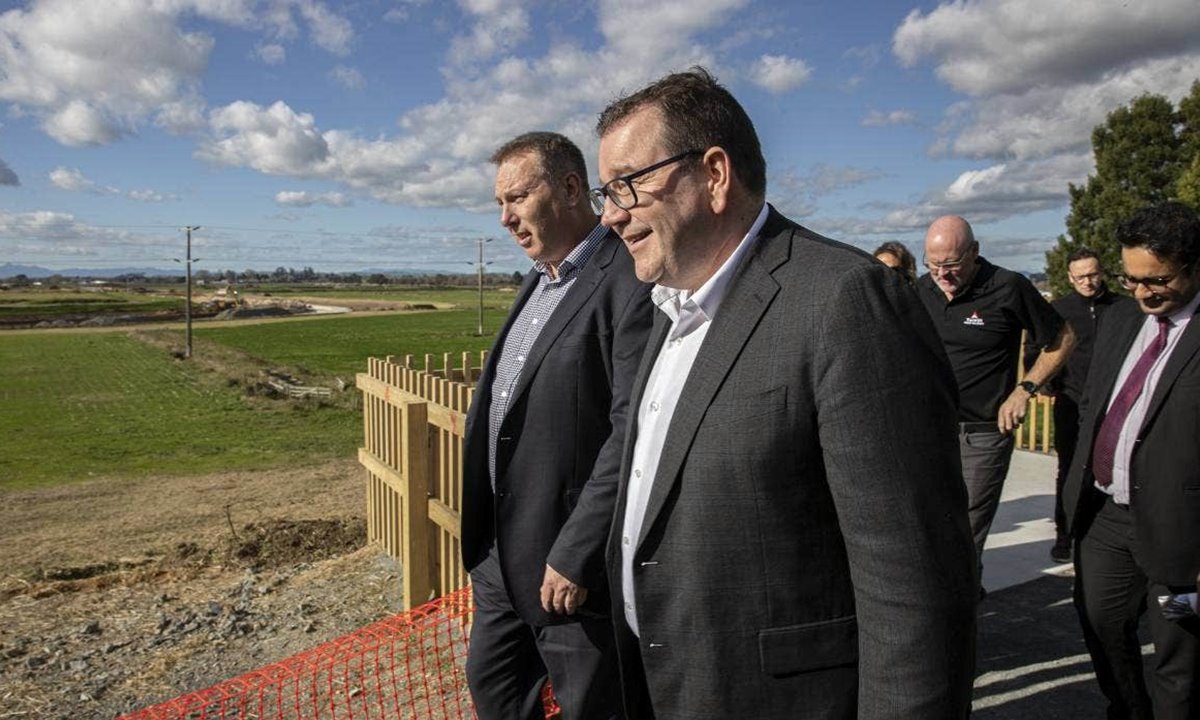Waikato’s economy is “booming” but challenges remain, including getting enough skilled workers across the country’s borders.
Finance Minister Grant Robertson was in Hamilton on Wednesday to talk to business leaders and visit some of the city’s construction hotspots.
During last year’s Covid-19 lockdown, one of the Government’s overriding concerns was how to keep unemployment under 10 per cent. Fast-forward 12 months, and one of the key messages from businesses is the need to access skilled labour from overseas.
The Government is working with sectors such as engineering and also the primary sector to address their workforce needs, Robertson told Stuff.“
Obviously with Covid, there are some restrictions with MIQ [managed isolation and quarantine] and so forth, but we are aware of that. That’s a short-term issue alongside the longer-term issue of the reset that we’re doing which also includes how do we train more New Zealanders to do these jobs as well,” he said.
Robertson’s Hamilton visit included a site tour of the Ruakura Superhub on the city’s eastern fringe.
 Finance Minister Grant Robertson said the scheme was needed so governments wouldn't have to design new income support schemes from scratch every time there was a big shock. Image: Christel Yarley/STUFF
Finance Minister Grant Robertson said the scheme was needed so governments wouldn't have to design new income support schemes from scratch every time there was a big shock. Image: Christel Yarley/STUFF
The superhub project, which is being developed by Tainui Group Holdings (TGH), is expected to take in 490 hectares once fully completed and will add about 8 per cent of urban and industrial land area to Hamilton. The development will also feature residential zones and a wetland.
Stage one of the development is under construction and takes in 92 hectares. As well as an inland port, stage one includes a logistics zone, an industrial zone, and a service centre adjacent to the yet-to-be-completed Waikato Expressway.
Robertson said Waikato is living up to its reputation as the engine room of the New Zealand economy.
“I think the Waikato economy is booming. I’m seeing construction, both vertical and horizontal, I’m seeing good community development as well, and I think Ruakura kind of symbolises that,” he said.
“You’ve got the inland port that’s going to be significant for New Zealand, you’ve got the development of housing which is also part of the site which is just so critical for us.”
 Robertson surveys Hamilton’s cityscape from one of Union Square’s soon-to-be-completed office buildings.
Robertson surveys Hamilton’s cityscape from one of Union Square’s soon-to-be-completed office buildings.
Image: Christel Yarley/STUFF
Robertson also spoke at the Waikato Business Summit hosted by Chartered Accountants Australia and New Zealand. The summit was opened by Hamilton mayor Paula Southgate who talked about the opportunities and challenges facing the city’s economy post-Covid-19.
Affordable housing is a necessary feature of a thriving city, yet many families and individuals are now living in emergency housing in Hamilton, Southgate said.
Hamilton’s current-day population of 180,000 is predicted to increase to about 200,000 by 2030.
“We need to supply on average 1200 new homes annually to meet the projected demand over the next 10 years,” Southgate said.
“The reality around that is that 57 new people are still moving to Hamilton each week, and they also need to be housed.”
Yet a desire to build more homes could be thwarted by supply chain issues, said ANZ chief economist Sharon Zollner who also spoke at the business summit.
“Dwelling consents are the highest in decades, however, there are real question marks around whether we can deliver all these houses when we are literally running out of both wood and nails and plumbing plastic and electrical wiring and steel.”
Robertson also visited the new Union Square precinct – a major downtown development covering half a city block. Union Square will feature five buildings, with the first building due to be completed in October.
Leonard Gardner, chief executive of Foster Construction Group, said the Union Square project is on schedule, but the group has to be conscious of its supply chain and be well organised.
Story by Aaron Leaman - Stuff
Republished with permission.



.jpg?sfvrsn=14164ce5_1&mode=crop&width=770&height=462&format=jpeg&quality=85)
.jpg?sfvrsn=414c0434_1&mode=crop&width=770&height=462&format=jpeg&quality=85)
.png?sfvrsn=16db4cf2_1&mode=crop&width=770&height=462&format=jpeg&quality=85)